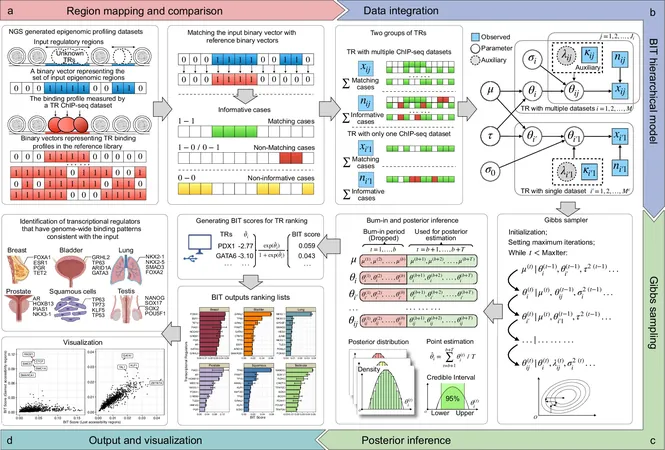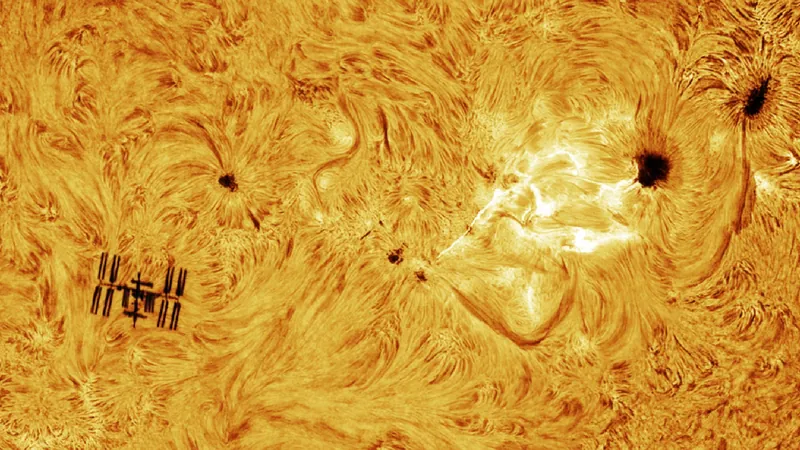
Revolutionizing Gene Research: How Bayesian Learning is a Game-Changer
2025-06-17
Author: Wei Ling
A Breakthrough in Genetic Research Tools
Scientists at The University of Texas at Arlington have unveiled an innovative computational tool that could transform our understanding of gene expression. This new technology identifies pivotal proteins known as transcriptional regulators (TRs), which play a crucial role in activating and deactivating genes.
The Significance of Transcriptional Regulators
Senior researcher Xinlei (Sherry) Wang, a Jenkins Garrett professor of statistics and data science, emphasizes the importance of these proteins in numerous biological processes, including growth, development, and the progression of diseases.
Introducing BIT: A Powerful New Framework
In a recent publication in Nature Communications, Dr. Wang, along with collaborators Zeyu Lu and Lin Xu, introduced a revolutionary tool called Bayesian Identification of Transcriptional Regulators from Epigenomics-Based Query Regions Sets (BIT). This framework utilizes Bayesian hierarchical modeling to assess probabilities across multiple layers of data, enhancing the accuracy of identifying TRs even in complex biological settings.
Moving Beyond Traditional Methods
Historically, researchers faced challenges in pinpointing which TRs were active in specific biological contexts due to reliance on markers that could be inaccurate. Wang explains, "Traditional methods often fall short. BIT leverages a comprehensive library of epigenomic data to enhance precision in identifying these crucial proteins."
Promising Applications in Cancer Research
Among the most exciting prospects for BIT is its application in cancer research. By identifying TRs essential for tumor survival, researchers can uncover vulnerabilities in cancer cells, leading to potential breakthroughs in treatment strategies that target specific TRs.
Transforming Health Insights and Treatment Strategies
Wang notes the broader implications of this research: "Understanding which TRs are involved in diseases like cancer allows us to develop targeted treatments that inhibit harmful TR activity while preserving normal cellular functions." This clarity could revolutionize approaches to not just cancer, but also metabolic disorders and heart disease, among other conditions.
The Future of Biomedical Research
Dr. Lu remarked on the profound impact of machine learning in biomedical research, suggesting that computational tools like BIT will become indispensable for uncovering new biological discoveries. By bridging the gap between complex epigenomic data and actionable insights, BIT holds the potential to accelerate breakthroughs in disease research, drug development, and personalized medicine.
The Power of BIT in Medical Advancement
As scientists continue to harness the capabilities of advanced statistical methods, BIT represents a significant leap forward, promising not just to enhance our understanding of gene regulation but also to pave the way for cutting-edge treatments that could save lives.



 Brasil (PT)
Brasil (PT)
 Canada (EN)
Canada (EN)
 Chile (ES)
Chile (ES)
 Česko (CS)
Česko (CS)
 대한민국 (KO)
대한민국 (KO)
 España (ES)
España (ES)
 France (FR)
France (FR)
 Hong Kong (EN)
Hong Kong (EN)
 Italia (IT)
Italia (IT)
 日本 (JA)
日本 (JA)
 Magyarország (HU)
Magyarország (HU)
 Norge (NO)
Norge (NO)
 Polska (PL)
Polska (PL)
 Schweiz (DE)
Schweiz (DE)
 Singapore (EN)
Singapore (EN)
 Sverige (SV)
Sverige (SV)
 Suomi (FI)
Suomi (FI)
 Türkiye (TR)
Türkiye (TR)
 الإمارات العربية المتحدة (AR)
الإمارات العربية المتحدة (AR)